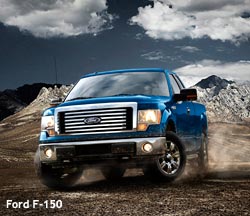automotive
You Say 'Loyalty,' I Say 'Retention'
- by Karl Greenberg , January 11, 2012

Both J.D. Power & Associates and Polk Automotive give Hyundai and Ford high honors for retaining customers, though Polk taps Ford as the top manufacturer for loyalty, while J.D. Power gives the nod to the Korean automaker.
The firms diverge when it comes to their methods of deriving loyalty data. J.D. Power's 2012 Customer Retention Study is based on responses from 117,001 new-vehicle buyers and lessees between February and May and in August last year. Among them, 73,733 replaced a vehicle that was previously acquired new. Polks's Auto Loyalty Awards, presented at the Automotive News World Congress in Detroit this week, are derived from transaction data from 5.5 million return-to-market new-vehicle purchases in the 2011 model year, from Oct. 1, 2010, through Sept. 30, 2011.
advertisement
advertisement
For those with a conspiracy-theory bent: J.D. Power is based in SoCal, some hours of traffic jams north of Hyundai Motor America headquarters, and Polk is in the Motor City, several thousand potholes away from Ford global HQ. In this two-parter, we'll ignore home-field advantage and focus on insights from the two firms.
In Polk's study, whose parameter for loyalty is a household that owns a new vehicle and returns to market and purchases or leases another new vehicle of the same model or make, Ford took top honors for the second year in a row. Ford has year-over-year repeat wins for overall loyalty to manufacturer, ditto for make (meaning the brand, such as Lincoln), African-American market loyalty, and pickup trucks. The F-150 has won in the latter category 14 out of the last 16 years. Also Ford's Escape is a first-time winner in the compact SUV category. Hyundai's Elantra wins in the compact car segment.
Both Polk and J.D. Power call Jeep the most-improved make in the loyalty arena. Polk says the brand's improvement is on the shoulders of the redesigned Jeep Grand Cherokee. Sibling brand Chrysler's Town & Country gets its 11th consecutive model-level win for minivans. The Porsche 911 was honored in the luxury sports car category, and the Lincoln MKZ won the luxury car category with a relatively new model.
As Ford sold 584,917 F-Series pickups last year, over a quarter of total Ford divisional sales, and as the F-150 was one of the division's two model-level loyalty winners, one might think the pickup is carrying Ford Motor Co.'s loyalty load in its flatbed. But Brad Smith, director of Polk’s Loyalty Management Practice says it's not so. "You could infer that, and if this were a company with fewer vehicles on the road you could defend that," he says. "But because Ford sales has substantial vehicles in operation, it's about more than the F150. The African American market is huge, and they also won for Lincoln's MKZ and Ford Escape."
He adds, however, that the automaker gets a slight lift from Mercury buyers of which are now, in Polk parlance, "orphaned owners," adding that such consumers are loyal up to a point. "For the most part they tend to stick with the same manufacturer when the return. But the further away from that point of separation, the fewer will come back. We see [orphaned owner] loyalty peak at three years," he says.
Smith also argues that manufacturers can count on the vaunted loyalty of pickup truck buyers only up to a point, because of gasoline prices. "They are driven by vehicle need, and you are starting to see fuel prices making some people question that need. For a while what we saw were people buying F-150's and then a Focus or Fiesta to offset fuel costs."
Perhaps surprisingly Subaru's Outback won Polk's loyalty award in the jam-packed mid-sized car category. While Subaru has legendary consumer loyalty, it is also highly geographic, as all Subarus have all-wheel drive. "Subaru's Forester has won several times in its category," says Smith. Their market share is driven by sales in certain parts of the country -- the mountain states and the northeast -- but they are non-existent in the south," he says. But in loyalty they are always in the top five."
That's possible because Polk scores are ratios, not sheer sales-and-registration numbers. The number of owners who return to market is the denominator, with the number who repurchased at the make, model, or manufacturer on top. "It's not dependent on volume at all," says Smith, "Which is why a vehicle like Land Rover Range Rover won [for luxury SUV] even though starts at $85,000."
Other winners in Polk's circle are Lexus RS for mid/full-sized SUV, Dodge Challenger for sports cars, and Honda for the Hispanic market. Tomorrow, J.D. Power's take on customer retention.




